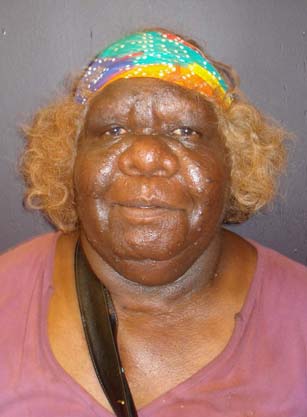Veronica’s mother Bababala (bush name )belonged to the country of Walgalli near Yagga Yagga on the Wangatjungka side.
Her creation story is the Seven Sisters dreaming .
Her father Wirru (bush name) is Walmatjarri skin group, and his country was Purraku, (Lake Gregory) in the region of Tjurraballen.
Veronica 2 paints the creation story of Mungi the flower that is abundance in this region. When Veronica was born her family lived at lake Stretch where they lived a traditional life collecting bush tucker and bush medicine.
Veronica saw white people for the first time when she was about 5 years old.
.
When Veronica was a young girl she was taken away to the live at old mission, and her parents lived at Billiluna community some 250 kms away.
Station and trained as a domestic worker and it was there that she met her husband Eddie Calyon.
Subsequentially Veronica had 8 children 3 girls and five boys.
.
One boy died in car accident at the age of four weeks old in 1973 an accident that she also incurred sever injuries. Veronica is a very strong culture woman and dancer and an enthusiastic teacher of culture to children, ensuring the traditional dances and songs are kept alive.
As for her children all six that are still alive are painters, which is strongly encouraged by Veronica. Veronica is holds a senior position in the community of Mulan.
She is a Marpan (traditional healer) and is an active community representative to do with land right issues and works closely with The IPA (Indigenous Protected Area) Council. Veronica commenced painting in 1979 and began to emerge as a leading artist in the late 1990s.
Her paintings are mainly concerned with her traditional country..
Veronica’s mother Bababala (bush name )belonged to the country of Walgalli near Yagga Yagga on the Wangatjungka side.
Her creation story is the Seven Sisters dreaming .
Her father Wirru (bush name) is Walmatjarri skin group, and his country was Purraku, (Lake Gregory) in the region of Tjurraballen.
Veronica 2 paints the creation story of Mungi the flower that is abundance in this region. When Veronica was born her family lived at lake Stretch where they lived a traditional life collecting bush tucker and bush medicine.
Veronica saw white people for the first time when she was about 5 years old.
.
When Veronica was a young girl she was taken away to the live at old mission, and her parents lived at Billiluna community some 250 kms away.
Station and trained as a domestic worker and it was there that she met her husband Eddie Calyon.
Subsequentially Veronica had 8 children 3 girls and five boys.
.
One boy died in car accident at the age of four weeks old in 1973 an accident that she also incurred sever injuries. Veronica is a very strong culture woman and dancer and an enthusiastic teacher of culture to children, ensuring the traditional dances and songs are kept alive.
As for her children all six that are still alive are painters, which is strongly encouraged by Veronica. Veronica is holds a senior position in the community of Mulan.
She is a Marpan (traditional healer) and is an active community representative to do with land right issues and works closely with The IPA (Indigenous Protected Area) Council. Veronica commenced painting in 1979 and began to emerge as a leading artist in the late 1990s.
Her paintings are mainly concerned with her traditional country..
